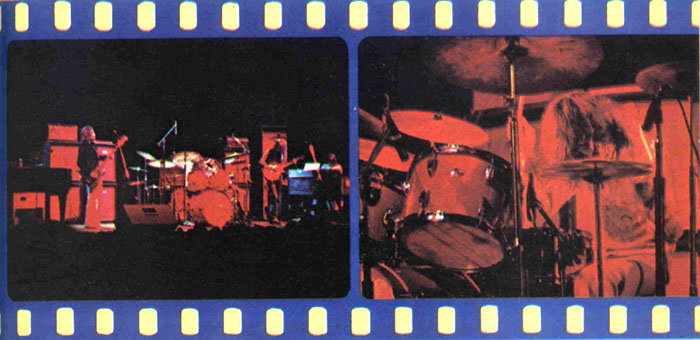
Procol HarumBeyond
|
|
PH on stage | PH on record | PH in print | BtP features | What's new | Interact with BtP | For sale | Site search | Home |
|

There probably isn't anyone who hasn't heard Grand Hotel at this point. Yet so beautiful is this album, and so unique, that you just can't talk about Procul [sic] Harum, or maybe even the current music scene in general, without mentioning it, and for more than one reason. To begin with, for lyricist Keith Reid and composer Gary Brooker, it is a triumph over five years that have not been without hassle ... or unhappiness, either, they quickly add. However, we must quickly add, that though this is Procol's seventh album, hassling even delayed Grand Hotel for a year. More important, however, in terms of song-writing, this LP does represent a kind of apex of their talent, the most beautiful thing they've done, a capping of everything they seem to be aiming for.
For Chris Copping, on organ; Mike [sic] Grabham, guitarist; Alan Cartwright on bass and BJ Wilson on drums this is the evolution of a sound that is very important. It is as exciting and dramatic as anything that glitters or freaks out on stage these days and nights. Yet it has an elegance, a grandeur, a genuine untricky beauty of the kind that hasn't been heard on the music scene in a long, long time. But like all new "babies," it didn't get born without pain.
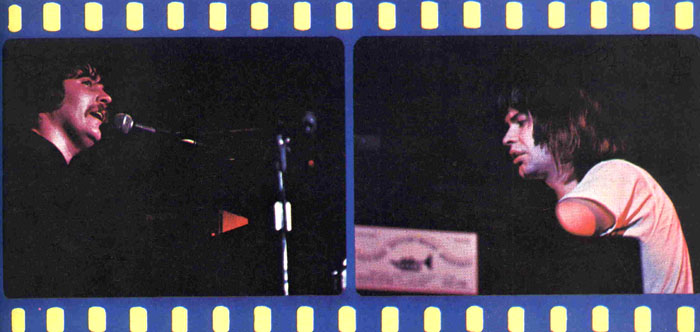
Like we said, Procol's been on the scene some five years, [??] in England, but wasn't known here in the States until about a year ago [??]. It was then that they recorded and released Procol Harum Live In Concert With the Edmonton Symphony Orchestra and the De Camera Singers. The Edmonton Symphony Orchestra, etc., was Canadian, which is where the record was made. But despite the unwieldy title, and the sharing of credits, this was the group's first commercial success, [sic] and won them their first gold record. And they did, indeed, want to follow up quickly with another album they just knew had to be a success. It was called - as it is now - Grand Hotel -and if anyone wants to go back and read the credits, just the Procol group please, will understand just why the disc was delayed.
The recording of Grand Hotel did commence, in fact, back then, at AIR Studios in London's West End. However, Edmonton proved such a hit, that an immediate tour of America was arranged - they were shrieking for the group. So, with little more than a few hours in the studio completed, they took off for the States.
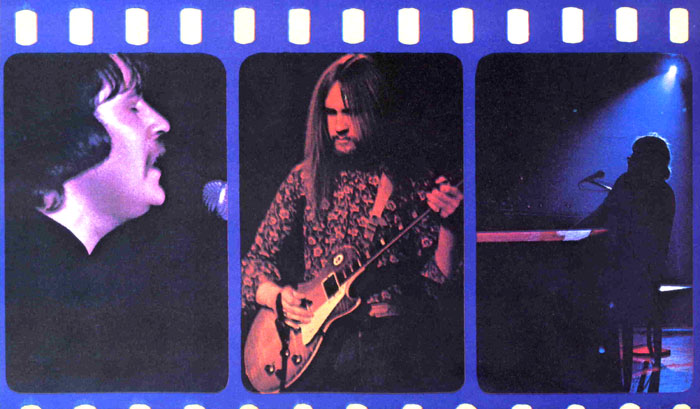
Once the tour was finished, recording started again, but it seemed that lead guitarist Dave Ball was finished with the group. And before recording could start again, Procol had to find themselves a new guitarist.
The search, fortunately, lasted only a few days, when a young man named Mick Grabham showed up to audition. He'd been a member of a very respected English group called Cochise, and he thoroughly knocked out the group when he played for them.
But the question of whether they really all could make it together was still there. Only one way to find out. The group was committed to a European tour - Mick would get his education in the ways of Procol and his Baptism by fire on the tour.
No sweat. He not only could do it, his rippling guitar lines shaped Procol's music into something never before achieved in the band. "Playing with Mick is exciting," pronounced Brooker after the tour.
But now it was time to get back to the recording studio again. Actually, about five tracks of Grand Hotel had been recorded with Ball. But with a new sound as exciting as they now had with Mick, it seemed logical that they should scrap what they had and start from scratch.
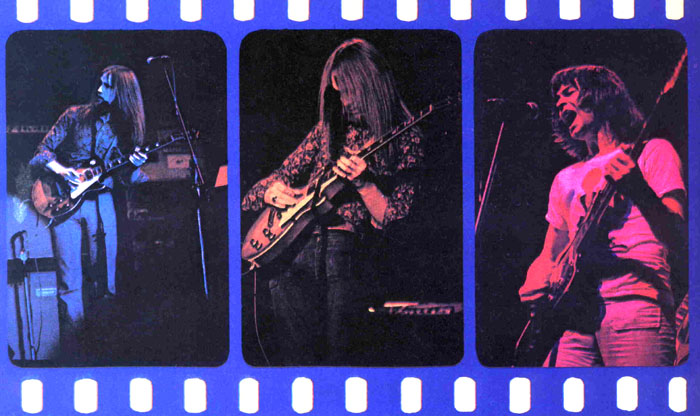
It meant more hassle and more delay but the results have definitely been worth it. It may have made "The Story of an Album" a long and tough one - which, by the way, it usually is - but then Keith Reid and Gary Brooker, Procol Harum's founding daddies, were long used to tough hauls and hassles by then.
For Keith, it all began way back when he was a mild and meek clerk in a London book store which specialized in law. But when he wasn't clerking he was compulsively penning pop tunes [sic]. He tried peddling them to any number of music publishers, and finally hooked up with one who felt his curious lyrics had something. In fact, they thought they knew who just might be the right composer to put melodies to those words, a musican named Gary Brooker.
At this point Brooker was part of the Paramounts, who spent most [sic] of their time backing up Sandie Shaw. But one meeting with Reid and the pianist set his entire collection of lyrics to music.
But they needed a demo tape, so they could get a record company to give them a contract. But no musicians, no tape - so they put an ad in the newspapers.
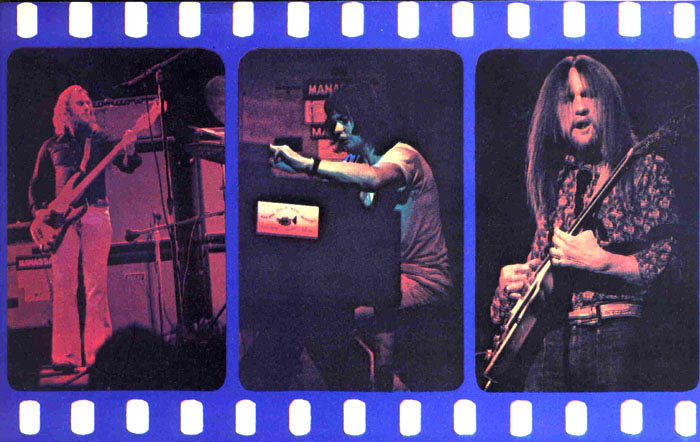
Matthew Fisher, who'd been the organist behind Screaming Lord Such [sic], and David Knights, unemployed bassist answered the ad and became part of the original Procol Harum - named for a Burmese cat owned by one of Keith's friends.
The demo was a success - one of the songs especially - and they were instructed to re-record it as a single to be released on the Regal Zonophone Records label [sic!]. The song was Whiter Shade of Pale, and was an immediate hit.
They, together with an acquired lead guitarist named Robin Trower and a drummer named BJ Wilson, were a real-live group!
Actually, Bobby Harrison was the first drummer, but BJ quickly inherited that role, and besides Keith and Gary, is the only early member of the group left.
They made, besides two [sic] albums, (Shine On Brightly and Salty Dog), an American tour, building up a small, but select cult among those who heard them. However, they also ran into their first [sic] personnel problem. Knights and Fisher were released from the band because of their "lack of enthusiasm."
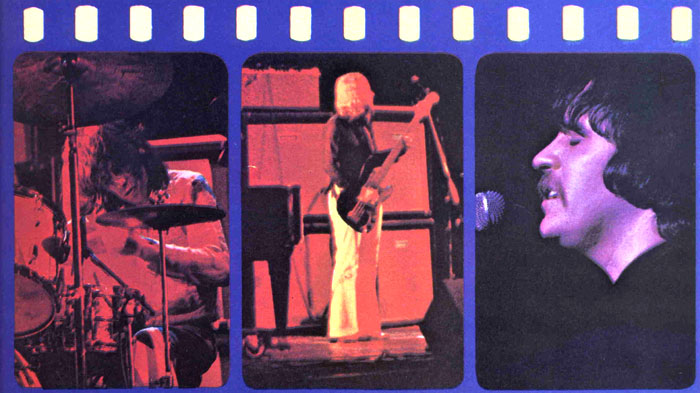
They were immediately replaced by the multi-talented bass and organist Chris Copping. Their next album Home had evolved into a newer and better [sic] sound because of Chris.
But the disasters were not over. Robin Trower left, to be replaced by David Ball, all of which was the climax to a disastrous Italian tour and an American tour which also ended rather badly. However, all was not tragedy. Copping [sic] brought in a friend, Alan Cartwright, to play bass while he concentrated on the organ and the sound was fuller and richer.
Next came the Edmonton album, and the rest, as they say, is history. In fact, with Grand Hotel, you might even say Procol is making history.
"It has reached a point," sighs Keith Reid happily, "where we all realize that this is not the kind of band that might break up tomorrow."
Thanks, Marvin, for the typewriter torment
PH on stage | PH on record | PH in print | BtP features | What's new | Interact with BtP | For sale | Site search | Home |